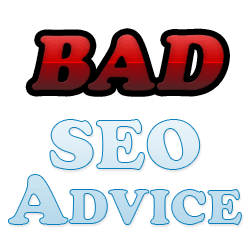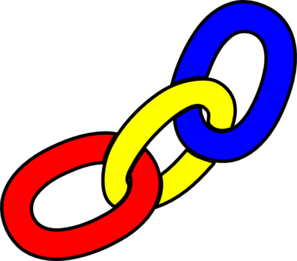
I talk a lot about SEO tactics which help your rankings, but for every reliable one, there are dozens more examples of bad SEO advice which people are either maliciously or ignorantly spreading as the truth.
While there is still a lot we admittedly cannot prove as being effective or ineffective or even harmful in the world of SEO (unless we’re Google), there are many things which many SEO specialists know to be true from experience.
With that in mind, let’s debunk a number of examples of bad SEO advice.
Once You’re #1 You Can Relax
Nope. If you’ve hit #1 in Google or any search engine, it’s because the work that you’ve put into your SEO campaign has paid off. Always wanting to serve up the best content, the search engine is basically giving you a shot to prove to them that their confidence in you was well placed.

Other sites are always gunning for that top spot and turning out quality content of their own, so once you’ve reached #1 then it’s no time to become complacent.
Continue with the work you’ve put in and for Pete’s sake, make sure your content is also optimized to motivate your audience to take whatever action you’re going for.
Nofollow Links Are a Waste of Time
Would you turn down a link from an authority site within your niche because it didn’t pass any link juice to your site? A nofollow link from a high quality site is worth far more than a dofollow link from a low quality which doesn’t have a lot of influence to pass on to begin with.
The thing which the “experts” forget in this case is that even if a link doesn’t pass influence in that sense, it’s still passing on traffic.

And aside from all of the wonderful things which that potentially valuable traffic can mean for your list, product, or brand, let’s not forget that that traffic is a user metric and an SEO factor, particularly in how those visitors interact with your website.
If your site suddenly gets a new reliable traffic source from a nofollow link and that traffic is highly targeted and spending a lot of time around your site, search engines will take notice of this and recognize it as an indicator that you have quality content on your site, content worth ranking.
Furthermore, that traffic can potentially lead to actual dofollow links from webmasters who found your quality content through that nofollow link and want to link to your site from theirs.
Lastly, from a pure backlink profile point of view, it will look incredibly suspicious to Google if your entire profile is made up of solely dofollow links. That doesn’t look natural and suggests potentially scammy and spammy behavior, so vary that backlink profile with a lot of link diversity to create the most natural looking profile.
SEO Plugins Will Make You Rank
Another piece of bad SEO advice. There are two misconceptions to point out about SEO plugins like Yoast or All-In-One.

1 – Simply having them installed/activated is enough. NOPE. Once the plugin is installed and turned on, you actually have to set them up on a macro and micro level. This means going back and identifying what keywords you’re targeting for your home page and individual pages, setting meta descriptions, etc.
2 – Okay, but once you HAVE set them up, then you’ll rank because of them. NOPE! Now don’t get me wrong. It’s important to identify to search engines what your content is about, and these plugins can help do that and help get your on page SEO house in order. But that’s just the tip of the on page SEO iceberg, and then you have the off page SEO side of things, meaning links.
So bottom line, SEO plugins are a good start to ensuring that your on page SEO signals are straight, but outside of a completely random keyword which no one on Earth is targeting, they alone won’t rank your site for anything.
Google is Smart Enough to Ignore Negative SEO

You’re really putting your site(s) at risk if you accept this bad SEO advice. Sometimes this may be the case, but do you want to leave it to chance if you suddenly find dozens or hundreds of links not made by you which are pointing to your site from spammy sites?
The disavow link tool exists for this purpose, so keep an eye on your backlink profile and use the tool when you spot something that looks suspect rather than trusting Google can differentiate between spam that you created versus someone else.
This is Greyhat, But It Works Right Now
This one is always a tricky piece of bad SEO advice which explains why many folks follow it.
In terms of blackhat or even greyhat SEO tactics, what worked 10 years ago didn’t work 8 years ago. What worked last year doesn’t work this year. What works this year (probably) won’t work next year.

But the fact that it’s working right now is oftentimes enough for many webmasters to ignore or assume that it won’t hurt them down the road.
If you’re not sure if some tactic may fall into this category or may be greyhat, just use common sense and follow your gut. If you’re still not sure, it’s certainly the safer option to err on the side of caution and avoid it.
This is the Best Tool For…
A lot of bad SEO advice comes from someone selling something. Whatever tools you use, remember that you should always take their results with a grain of salt.

For example, compare any number of analytical tools for the same task and you’ll likely see wildly different results.
For this reason it’s important to consult a number of different tools and average out their results rather than relying on any one tool (no matter how much anyone else swears by it) in order to get the most accurate information to base your decisions off of.
Google Can/Can’t Be Trusted
This one’s admittedly a bit more complicated as far as bad SEO advice goes but let’s state what should be obvious: anything Google tells us should be taken with a grain of salt. It’s in their best interest to both:

1 – Not let on as to what actually works to rank a website because people will abuse it, rendering the Google algorithm less effective and consequently making Google’s listings less reliable for the people who use it for search which hurts Google’s bottom line.
2 – Teach well meaning webmasters how to rank well so that their quality content helps in turn make Google look good.
The best advice here when Google explicitly says that “this or that” matters for ranking your website is to test it out yourself if possible.
Research it, communicate with other SEO peers that you trust to get their opinions, and once again and most importantly, try it yourself if applicable.
Buying Links Works!
Just making sure that you’re still paying attention with this one. No, no it doesn’t, unless the goal is to get de-indexed completely.

Just remember that sometimes this bad SEO advice is disguised as credible because the methods are tweaked slightly. For example, the private blog network craze of the last several years was considered as being different and effective simply for the fact that it was more complex and everything was hidden.
As a word on that, if there’s a footprint, then it’s not hidden and as such, it won’t work. So despite the complexity, it’s still link buying, and the trail will always lead back to you, and consequently it won’t work or worse it will get you penalized by Google.
In Summary
If you’re not sure if something is good or bad SEO advice, try it out yourself if possible. If it seems too easy or if someone is guaranteeing anything if you do it, odds are it’s not to be trusted.
This is your website and potentially your own livelihood on the line here, so use your own due-diligence, take everything with a grain of salt, and always over-deliver with the quality of your content and you’ll be fine.
